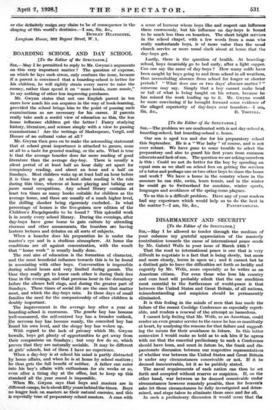BOARDING SCHOOL AND DAY SCHOOL [To the Editor of the
SPECTATOR.] 'SIR,—May I be permitted to reply to Mr. Gwynn's arguments on this very important matter ? The question of expense, on which he lays such stress, only confuses the issue, because if a parent is convinced that a boarding-school is better for his children, he will rightly strain every nerve to raise the money, rather than spend it on ` more books, more music," to say nothing of other less improving purchases.
Mr. Gwynn states that not one English parent in ten cares how much his son acquires in the way of book-learning, provided the school brings him to the point of passing such examinations as are necessary for his career. If parents really take such a sordid view of education as this, the less home influence children get the better I Fancy studying history, literature, and science simply with a view to passing examinations Are the writings of Shakespeare, Vergil, and Romer of no cultural value at all ?
Mr. Gwynn then goes on to make the astounding statement
that at school great importance is attached to games, none at all to a taste for general reading, or the arts. What is true is that the average boarder does far more reading of good literature than the average thy-boy. There is usually a silent period of at least half an hour daily set apart for compulsory reading, and about an hour and a half on Sundays. Most children wake up at least half an hour before it is time to get up. At school silent reading is the rule during this time, whereas at home playing and talking are ,more usual occupations. Any school library contains at least ten times as many books suitable for children as the average home, and these are usually of a much higher level, the shilling shocker being rigorously excluded.. In what percentage of homes is the five-guinea new edition of the Children's Encyclopaedia to be found ? This splendid work is in nearly every school library. During the evenings, after thy-boys have gone home to gain culture by attending cinemas and other amusements, the boarders are having lantern lectures and debates on all sorts of subjects.
When a boarder does his preparation he is under the master's eye and in a studious atmosphere. At home the conditions are all against concentration, with the result that " home work " is usually badly done.
The real aim of education is the formation of character, and the most beneficial influence towards this is to be found in associating with other boys. Conversation is impossible ;during school hours and very limited during games. The time they really get to know each other is during their free time in the evenings, and that precious hour in the dormitory before the silence bell rings, and during the greater part of Sundays. These times of social life are the ones that matter Most, and which the day-boys miss. In these days of small families the need for the companionship of other children is doubly important.
The improvement in the average boy after a year at boarding-school is enormous. The gauche boy has become Fell-mannered, the self-centred boy has a broader outlook, ,the nervous boy has become manly, the conceited boy has found his own level, and the sleepy boy has woken up. With regard to the lack of privacy which Mr. Gwynn
bewails, boys get plenty of opportunities to get away from their companions on Sundays ; but very few do so, which proves that they are naturally sociable. It may be different at girls' schools, but of them I have no experience.
When a day-boy is at school his mind is partly distracted
by home affairs, and when he is at home by school matters ; he thus gets the full benefit of neither. A father can enter into his boy's affairs with enthusiasm for six weeks or so, even after a tiring day at the office, but to keep up this standard all the year round is impossible.
When Mr. Gwynn says that boys and masters are in different camps, he is about fifty years behind the times. Boys no longer look on masters as their natural enemies, and this is especially true of preparatory school masters. A man with a sense of humour whom boys hire and respect can influence them enormously, but his influence on day-boys is bound to be much less than on boarders. The short bright services in the school chapel, with a few words from a man who really understands boys, is of more value than the usual church service or more usual slack about at home that the day-boys get.
Lastly, there is the question of health. At boarding school, boys invariably go to bed early, after a light supper. Can one say the same of day-boys ? How many colds have been caught by boys going to and from school in all weathers, thus necessitating absence from school for longer or shorter periods? " What does one or two days' absence matter ? " someone may say. Simply that a boy cannot make head or tail of what is being taught on his return, because be has missed the work leading up to it. Mr. Gwynn would be more convincing if he brought forward some evidence of the alleged superiority of day-boys over board_ ers.—I am.






































 Previous page
Previous page